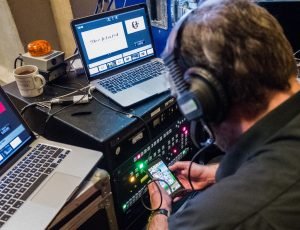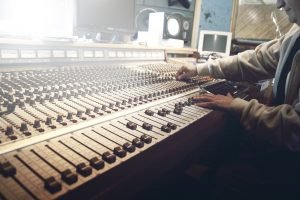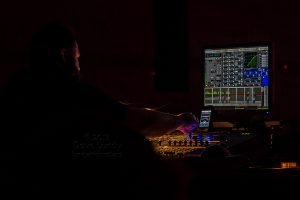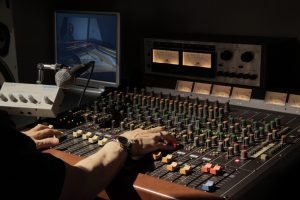This post may contain Amazon® product affiliate links. We may receive a commision if you make a purchase after clicking on one of these links but at no cost to you. Please visit Our Disclosure Page for more information. Thank you.
 A recording engineer will use sound recording equipment in order to produce, record, mix and synchronize voices, sound effects and music. An engineer can also work at a television broadcast studio, theater, or sports arena. Those individuals interested in degree programs for the engineer should weigh several factors, including the amount of money and time they want to invest in their education, in addition to internship opportunities and the job growth for this field.
A recording engineer will use sound recording equipment in order to produce, record, mix and synchronize voices, sound effects and music. An engineer can also work at a television broadcast studio, theater, or sports arena. Those individuals interested in degree programs for the engineer should weigh several factors, including the amount of money and time they want to invest in their education, in addition to internship opportunities and the job growth for this field.
Working in a recording studio, you’ll enjoy making high quality recordings of sound effects, speech and music. If you love working with electronics and you’re interesting in sound and music, this job is definitely for you. in this position you’ll need to possess a good sense of hearing, a natural understanding of timing, pitch and rhythm.
In order to develop your skills in this field, you can start off by completing some basic courses at a local community college or university. If formal training isn’t your thing, you can also get your foot in the door by working as a runner in a recording studio. Working as a runner will allow you to obtain field experience and work your way up the position of engineer. Of course, these days, in order to land a high paying position as a recording engineer, most studios require not only a ton of work experience but professional training as well.
Earning your Stripes in the Music Industry
 The aspiring engineer can find a program in such fields as recording arts or broadcasting technology, offered at diploma, associate’s, bachelor’s and master’s degree levels. These programs are available at community colleges, music schools and universities.
The aspiring engineer can find a program in such fields as recording arts or broadcasting technology, offered at diploma, associate’s, bachelor’s and master’s degree levels. These programs are available at community colleges, music schools and universities.
Schools that offer training for recording engineers will offer different program options, in fields such as broadcast technology, electronics and computer networking.
With access to current digital technologies, a recording artist can bypass recording studios and utilize software programs on their PCs. This is why it can be important for an engineer to have in-depth knowledge of trends in this type of technology. A student might also want to look into the relationship a school has with local recording studios, in order to determine what type of internship opportunities are available.
When selecting a school, the size of a class can also be a factor. Training as an engineer will typically require individual attention and personal feedback. A student who wants to have one on one time with their teacher or needs a smaller class size, should look for a program that features a low student to teacher ratio.
An additional factor that can play a part in determining if a school has a program that’s right for you is their internship program. Hands on experience in this field is essential when it comes to qualifying for employment after graduation. An internship can provide a student with field experience while they obtain academic credits. A student should look for a program that has proven relationships with local recording industry employers, such as movie, television and radio studios, sports arenas and community theaters.
Interning as an Engineer
 As the music industry continues to change and evolve, so does the recording industry. Now, thanks to high tech software recording programs, people can produce an album at home. With this new digital era, training for the engineer has never been so complicated, demanding and downright difficult. Not only can it be a trial to complete an internship and deal with people giving you some of the worst jobs in the studio, but you also have to prove yourself for several months before some studios will even let you attend a recording session. Internships are hard to come by, period. If you’re not up for the challenge or determined to land one, don’t even bother with this career field. Move on and find something that’s more your speed. But for the rest of you, those who are passionate about music and creating amazing tracks and working in the studio, dedication and determination will get you far. But for starters, just focus on getting a good internship.
As the music industry continues to change and evolve, so does the recording industry. Now, thanks to high tech software recording programs, people can produce an album at home. With this new digital era, training for the engineer has never been so complicated, demanding and downright difficult. Not only can it be a trial to complete an internship and deal with people giving you some of the worst jobs in the studio, but you also have to prove yourself for several months before some studios will even let you attend a recording session. Internships are hard to come by, period. If you’re not up for the challenge or determined to land one, don’t even bother with this career field. Move on and find something that’s more your speed. But for the rest of you, those who are passionate about music and creating amazing tracks and working in the studio, dedication and determination will get you far. But for starters, just focus on getting a good internship.
So what is a good internship? Well. To start, you want to work in a studio where there is potential for you to actually get your hands on a console or set up equipment, after you complete your grunt work for the day. You also want to work at a studio that has a reputation for promoting their interns. Flexibility is very important, so you’ll definitely need to ditch your social life, but most studios are understanding of school schedules.
As you learn the ins and outs of the studio and interact with the staff, consider whether or not that particular studio is even a place you would want to work at after school. If the crew is fun, easy to work with and more than willing to give you a shot, then the odds are they’re a good team to work with on a professional level. But if you realize that the recording team consists of unprofessional people you wouldn’t want to work with on a full-time basis, move on after the internship is over. The important part is obtaining the work experience. Don’t commit to staying on at a studio and in an environment you don’t enjoy, and in a place where you can’t thrive.
Degree and Certificate Programs for Engineers
 A certificate program can be completed in less than a year. Enrollment requirements will vary from school to school but will typically include a high school diploma or the equivalent.
A certificate program can be completed in less than a year. Enrollment requirements will vary from school to school but will typically include a high school diploma or the equivalent.
The associate’s degree program can be completed in two years and will provide the aspiring engineer with the foundational knowledge and skills that are necessary in order to be successful in this field. During this program a student will be able to participate in an internship program, usually during the last semester.
The bachelor’s degree program for engineers can be completed in four years and will also include an internship component. Students in this program will receive the required core training in recording and audio.
The master’s degree can be completed in three years and is designed to prepare the graduate for advanced positions in this field.
